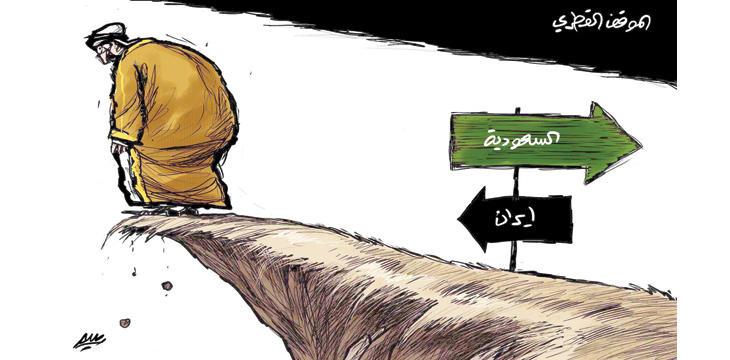Cairo – Days ago (June 5, 2017), Arab peoples woke up on hearing the news of cutting ties with Qatar by many Arab countries. This was not a surprising step as it was against the backdrop of a set of media and official campaigns between Qatar, on one hand, and its boycotting countries on the other.
Although express reasons for this boycott include various claims, ranging from supporting terrorist and extremist Takfiri groups in the region until destabilizing situations in the Gulf countries, many analysts consider that the main reason lies in the ties between Doha and Tehran. The growth and development of such ties led to raise the concerns of GCC countries (i.e. the Gulf Cooperation Council) from penetration by Persian neighbors to their Arab vicinities.
Iran and Qatar have close political, economic and military ties. Unlike most of GCC States, especially Saudi Arabia and the United Arab Emirates, Qatar refrains from criticizing Iran’s internal and external activities. It even cooperates with Iran for decades despite the international embargo and boycott that were imposed on Republic of Iran until signing the nuclear deal in 2015.
Economic Ties:
Qatar and Iran have close economic ties, especially in petroleum and gas industries, where much of Qatar’s oil comes from Iran’s North Gas Field, which is described by reports of the International Energy Agency (IEA) as the world’s largest gas field with 50.97 trillion cubic meters of gas with an area of about 9,700 square kilometers, including 6,000 km2 in Qatar’s territorial waters and 3,700 in Iranian waters. In addition, Qatar produces 6,500 million cubic meters of gas per day from its part in the field, whereas Iran produces 430 million cubic meters of gas from this field.
Moreover, the volume of trade exchange between Qatar and Iran in 2015 amounted to 5 billion dollars and there are mutual and serious efforts between Qatar and Iran to raise the share of trade between the two countries, especially after the lifting of sanctions on Tehran. However, after the recent Arab boycott of Qatar, it is likely that the volume of trading cooperation will increase and reach unprecedented levels after Iran’s declaration of its readiness to provide goods and supplies to Qatar to replenish the shortage. Assistant Governor of Economic Affairs of Bushehr, Said Zerin Far, announced that “due to the close distance between Bushehr and Qatar, Bushehr Port will be designated as an economic exchange center between Iran and Doha with a aim of developing exports between both sides.”
Media Ties:
Qatar is largely dependent on its media tools and cultural institutions to influence in its Arab and regional periphery. By looking at the way in which Al-Jazeera Channel covered the latest Iranian elections, for example, it becomes clear that there is a Qatari orientation towards Iran as a democratic state that transcends the democracy of the West, forgetting the dictatorship of the mullahs’ regime, suppressing peoples and its interventions in the region. For example, during the recent elections, Iran hosted about 39 delegates from the Qatari media and research institutions, and Al Jazeera delegated a team of its elite broadcasters, led by the Tunisian, Mohamed Krishan.
Following the recent decision by the Arab countries to boycott Qatar, the tone of Qatari media changed towards Iran and its allies, as Al Jazeera’s website used the term “The Syrian Arab Army” instead of “The regime’s forces” which it has been using since 2011. Al-Jazeera also covered Hassan Nasrallah’s speech in which he attacked the three Riyadh summits that have been held recently.
Even culturally, relations between the two countries have deepened to the point where Qatar directly financed some Iranian films. As the Doha Film Foundation, owned by Al-Mayassa bint Hamad bin Khalifa Al-Thani, the sister of the Emir of Qatar, financed the “The Seller” which is an Iranian film that won the Oscar Prize in 2017. As a result, protests within Tehran’s cultural circles escalated, and a number of articles appeared in Iranian newspapers attacking Qatar’s funding of Iranian films, because of Qatar’s support for Takfiri terrorism in the region. The Iranian political circles also warned Iranian director “Farhadi” of dealing with Qatar.
Egyptian Journalist and Member of Parliament, Dr. Abdel Rehim Ali is an expert on Islamist Movements and political Islam. This essay is adapted from his upcoming book “Qatar: The Destabilizer of the Middle East: The Full Story of Grand Conspiracy,” which will be published later this month.








































admin in: How the Muslim Brotherhood betrayed Saudi Arabia?
Great article with insight ...
https://www.viagrapascherfr.com/achat-sildenafil-pfizer-tarif/ in: Cross-region cooperation between anti-terrorism agencies needed
Hello there, just became aware of your blog through Google, and found ...